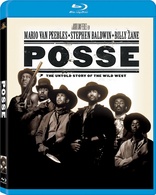Posse Blu-ray Movie
HomePosse Blu-ray Movie 
Metro-Goldwyn-Mayer | 1993 | 111 min | Rated R | Jun 07, 2011Movie rating
6.5 | / 10 |
Blu-ray rating
| Users | 3.5 | |
| Reviewer | 3.5 | |
| Overall | 3.5 |
Overview
Posse (1993)
A group of mostly black infantrymen return from the Spanish-American War with a cache of gold. They travel to the West where their leader searches for the men who lynched his father.
Starring: Mario Van Peebles, Stephen Baldwin, Blair Underwood, Woody Strode, Melvin Van PeeblesDirector: Mario Van Peebles
| Western | 100% |
Specifications
Video
Video codec: MPEG-4 AVC
Video resolution: 1080p
Aspect ratio: 2.35:1
Original aspect ratio: 2.39:1
Audio
English: DTS-HD Master Audio 2.0
Spanish: Dolby Digital Mono
French: Dolby Digital 2.0
Subtitles
English SDH, French, Spanish
Discs
50GB Blu-ray Disc
Single disc (1 BD)
Playback
Region A, B (C untested)
Review
Rating summary
| Movie | 4.0 | |
| Video | 4.0 | |
| Audio | 4.0 | |
| Extras | 0.0 | |
| Overall | 3.5 |
Posse Blu-ray Movie Review
The Outlaws No One Knew
Reviewed by Michael Reuben July 24, 2011Mario Van Peebles has had a unique career as writer, director, actor and famous son of a famous father, Melvin, whom Mario has twice portrayed on film: once (in Sweet Sweetback's Baadasssss Song) as a teenager playing his father losing his virginity under his father's direction, and once (in Baadasssss!) playing his father directing his younger self in that very scene (and other scenes from his unusual childhood). For over thirty years now, Van Peebles has worked successfully in mainstream film and TV while, every so often, creating something distinctive, abrasive, personal and challenging. One of those projects, 1991's New Jack City, launched several careers and remade the look and sound of urban crime drama. Two years later, Van Peebles tried to do the same thing for westerns with an ambitious effort called Posse. The film didn't catch on, possibly because Clint Eastwood beat Van Peebles to the revisionist western punch the year before with Unforgiven, but Van Peebles' film itself remains worthwhile.
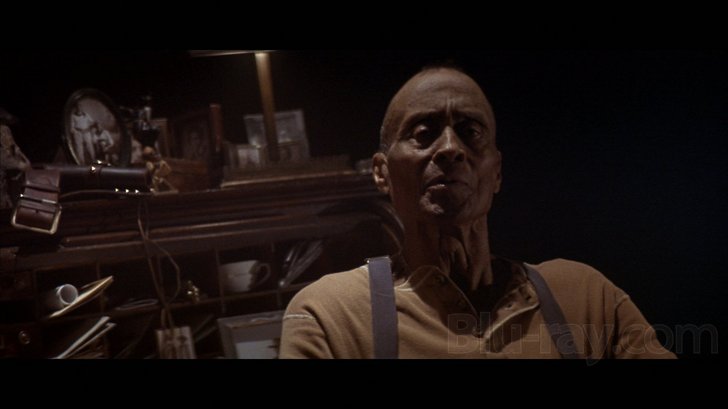
The Storyteller
For the most part, Posse unfolds in a traditional chronological narrative. However, the script by veteran actor Sy Richardson (most recently the phlegmatic coroner on Pushing Daisies) and Dario Scardapane (creator of NBC's Trauma) doesn't parcel out story information in the usual way. You're typically tossed into the middle of a situation, and only gradually are snippets of information revealed that explain the setup and motivations -- and by that time, bullets and fists are flying. I like this approach, because it keeps me interested and alert, but some viewers may find it frustrating. We begin with a man known only as the Storyteller, who is played by Woody Strode, the barrier-breaking African-American athlete and actor and a veteran of Once Upon a Time in the West and others films too numerous to list. (Strode was 78, and this would be his last major role; after a small part in The Quick and the Dead, he died in 1994 at the age of 80.) Seated at an antique desk stuffed with photographs and other mementos, the Storyteller speaks of the freed slaves who rode west after the Civil War to become cowboys, because they had no other opportunities. Then he tells of Jesse Lee (Van Peebles) and the men he rode with. He calls them "the original posse". In 1898, Jesse is a soldier fighting for the U.S. army in the Spanish-American War in Cuba. How Jesse entered the military is a crucial plot point that isn't revealed until much later in the film. His commanding officer is Colonel Graham (Billy Zane), a vicious and corrupt racist who is less interested in fighting the Spanish than in lording his authority over those he commands. He summarily executes one deserter, frees another known as "Little J" (Stephen Baldwin), giving him Jesse's command, and uses one soldier, called "Weezie" (Charles Lane), as a personal attendant, whom he introduces as the last surviving member of the "Motiza" tribe, because he's trained Weezie to ask him: "Mo' tea, suh?" The Colonel orders Little J and Jesse to take a squad behind enemy lines and capture a shipment of guns and ammo from the Spanish to resupply the American troups. The group includes Weezie, Obobo (former basketball player and pro wrestler Tiny Lister) and Angel (rapper Tone Lôc). But after the group successfully overpowers the guards protecting the shipment, they discover that it's really a treasure trove of Spanish gold coins, which the Colonel clearly wants for something other than military purposes. Suspecting (correctly) that the Colonel doesn't intend to share, the gang, now outlaws, seizes the gold and hightails it out of Cuba with the Colonel and his men in hot pursuit. They stop in New Orleans for R&R, where Little J, a compulsive hustler, crosses aces with a card sharp known as "Father Time" (Big Daddy Kane). Both of them, in turn, end up on the wrong side of a big-time gambler named Jimmy Love, played by the legendary TV writer and producer Stephen J. Cannell (who recently passed away after memorable cameos on ABC's Castle). Pursued by both Jimmy Love and Colonel Graham, Jesse Lee's posse rides west from New Orleans toward a destination that only Jesse Lee knows.

Posse Blu-ray Movie, Video Quality 
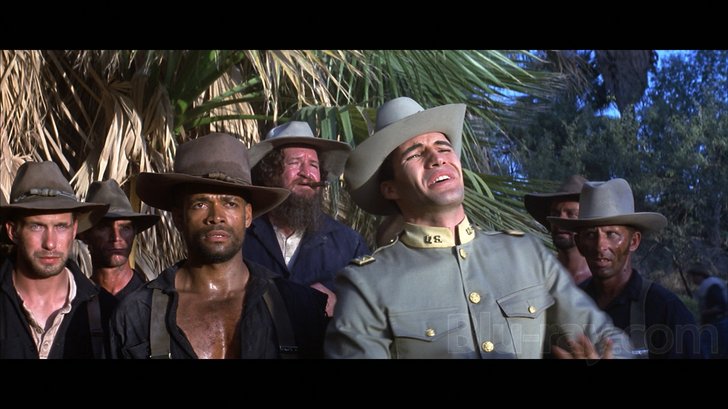
Sumptuously shot by Peter Menzies, Jr. (Die Hard with a Vengeance, The Incredible Hulk), Posse comes to Blu-ray in a 1080p, AVC-encoded presentation that preserves the golden, burnished, storybook glow suggested by the photos lovingly handled by Woody Strode's Storyteller in the film's prologue. Despite the rap-flavored soundtrack, this story is presented as history -- not history written in books, but history remembered, then passed down in a great oral tradition. But Menzies' nostalgic lighting doesn't come at the expense of image quality. For most of the film, the image is sharp and detailed; the principal exception is night scenes, which stand out mostly by their comparative softness and more noticeable grain. Colors are vivid and saturated, with browns and ambers predominant in the western sequences, greens and blues prominent in Cuba and reds plentiful in New Orleans. (Between New Orleans and the frontier, there's also a beautiful snowy mountain passage.) Blacks are generally strong with little or no crushing, except in a handful of night scenes, where the effect appears to be an element of the original photography. With no major extras, the film has the full space of a BD-50 in which to breathe, and I saw no digital artifacts or compression-related issues.
Posse Blu-ray Movie, Audio Quality 
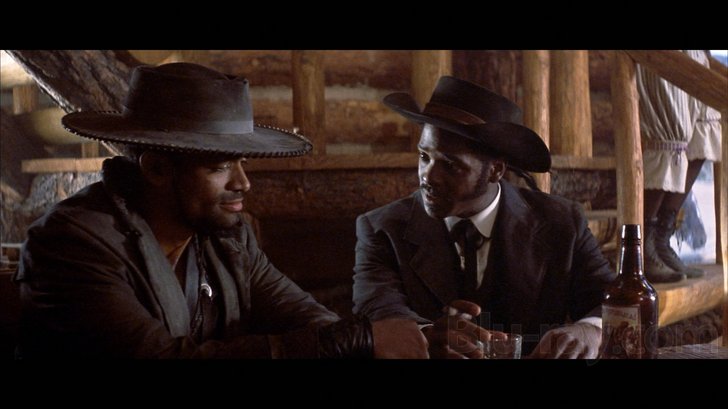
The film's original stereo surround mix has been presented in DTS lossless, and it sounds terrific, especially when played through Prologic II or IIx. The track has wide dynamic range with deep bass extension that lends credibility to both the action sequences and the Michel Colombier (New Jack City) soundtrack. While the directionality of sound effects isn't as clear and specific as a discrete 5.1 mix could provide, there's a sense of immersion in the scene that comes from the left and right channels wrapping themselves into the surrounds. Meanwhile, essential dialogue remains clear and front-anchored (I say "essential", because Posse is the kind of film where dialogue takes a back seat to imagery and, for lack of a better word, attitude in propelling the narrative). This is yet another situation where leaving well enough alone was the right decision, because a discrete remix of Posse's original elements would probably have robbed the soundtrack of its immersive qualities. To achieve the same effect in a true 5.1 format would have required starting over from scratch.
Posse Blu-ray Movie, Special Features and Extras 
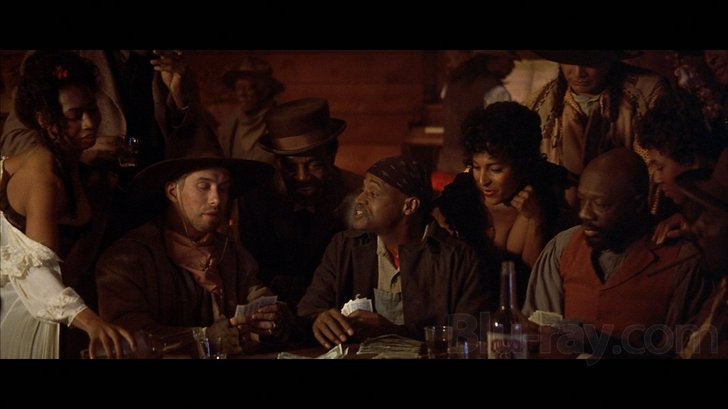
Mastered with the usual cut-rate approach that Fox employs on MGM discs, Posse features BD-Java, no main menu, no bookmarking capability, no advanced features and only one "special" feature:
- Theatrical Trailer (HD; 1.85:1; 2:10). In style and flash, the trailer may have made the film look too much like a music video. But coming the year after Unforgiven, the marketing people probably were afraid that too elegiac a tone would make the film seem merely derivative, which it most certainly is not.
Posse Blu-ray Movie, Overall Score and Recommendation 
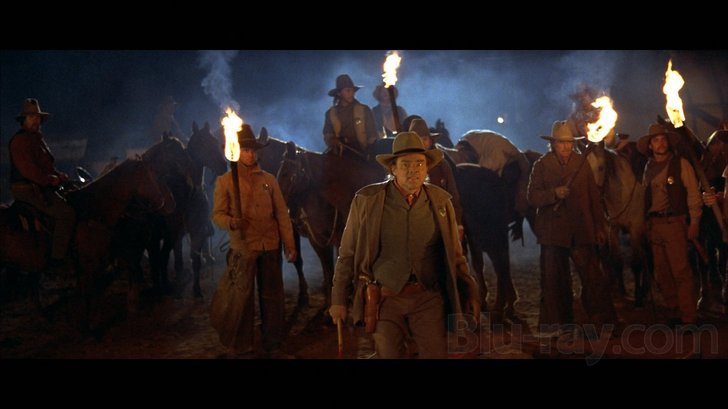
Posse isn't a perfect western, but it's one of the most original and unusual takes on the genre in the last thirty years, and it deserves to be seen more than it was on its initial release. While lacking in extras, this Blu-ray at least presents a superior image and an accurate soundtrack that is true to the original film. Fans of traditional westerns may find Posse jarring, because it upends expectations of how the characters in a western should behave, but that's what makes it worth seeing. Highly recommended. However, if you're not sure, at least give it a rental.
Similar titles
Similar titles you might also like

The Hills Run Red
Un fiume di dollari
1966

The Ballad of Lefty Brown
2017

Chato's Land
2K Restoration
1972

Rancho Notorious
Warner Archive Collection
1952

Jesse James
Fox Studio Classics
1939

The Kid
2019

The Outsider
2019

In a Valley of Violence
2016

The Spikes Gang
1974

The Fastest Gun Alive
Warner Archive Collection
1956

The Law and Jake Wade
1958

Valdez Is Coming
1971

Sweetwater
Sweet Vengeance
2013

Dodge City
1939

The Last Hard Men
1976

The Last Sunset
El Perdido
1961

The Sons of Katie Elder
1965

Hang 'Em High
50th Anniversary Edition | Shout Select #57
1968

Pale Rider 4K
1985

The Duel
2016
